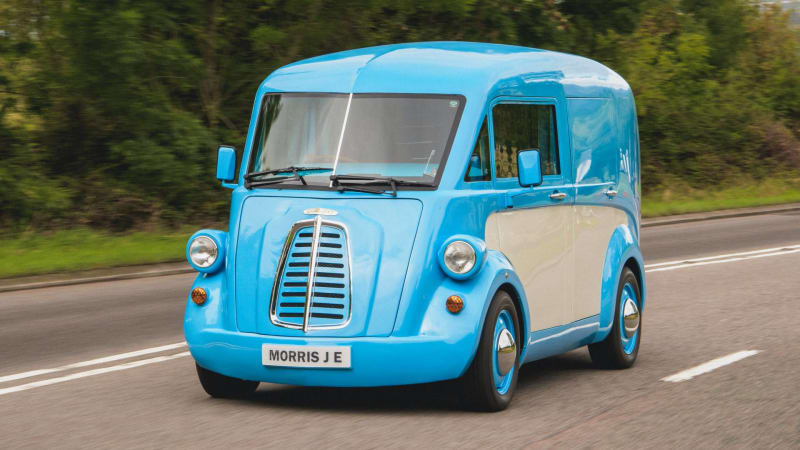1949 Morris J-Type resurrected as electric, carbon fiber-bodied van
https://ift.tt/33MCegy

European investors resurrected England’s Morris Commercial, a firm that spent decades in the grave, and unveiled an electric van named JE. The cargo-hauling two-seater wears a heritage-laced design inspired by one of the most recognizable models Morris Commercial made.
Developed in England, the JE is a tribute to the J-Type van made between 1949 and 1961. It retains several of the original model’s defining styling cues, including a tall grille split in half by a chromed vertical slat, and headlights mounted on top of the fenders. The overall proportions are period-correct, too, but the JE shares nothing with the J-Type that crisscrossed England for decades.
The body is made with carbon fiber to keep weight in check, and it’s dropped on a new platform developed specifically to underpin electric vehicles. Don’t expect to find the Morris Oxford’s sidevalve engine nestled between the front seats. Power comes from an electric drivetrain built around a lithium-ion battery pack that delivers up to 200 miles of driving range, though full specifications remain under wraps. What’s certain is the layout clears up a cargo compartment that’s low and flat. You’re out of luck if you want to order the JE with a turbo four, or a plug-in hybrid powertrain; Morris Commercial clearly stated it will never make a model powered by an internal combustion engine.
Though 200 miles hardly qualifies the JE for the coveted long-range label, Morris envisions it as an urban delivery vehicle. It’s capable of hauling 2,200 pounds in its 194-cubic-foot cargo compartment, a figure which makes it comfortably more capable than the Ford Transit Connect, but less competent than bigger models like the full-size Transit. Its overall dimensions remain under wraps.
Morris plans to build the JE in the United Kingdom, though it hasn’t revealed where yet. Production is tentatively scheduled to begin in late 2021, and pricing will start at about 60,000 British pounds, a princely sum that represents about $77,000 at the current conversion rate. Autoblog reached out to the company to find out if it has sights on the American market, and we’ll update this story if we learn more. Regardless, it will need to fend off competition from the production variant of the similarly retrolicious Volkswagen ID Buzz concept, which is due out globally in 2022.
Looking ahead, Morris Commercial plans to extrapolate a full range of models from the modular platform. It wants to launch a people-carrying model, a pickup, and a camper van, among other body styles. The company told Autocar it expects approximately 1,000 motorists will spend Audi RS 5 money on an electric van each year, though the aforementioned variants will increase that number.
Auto Blog
via Autoblog https://ift.tt/1afPJWx
November 13, 2019 at 03:02PM
